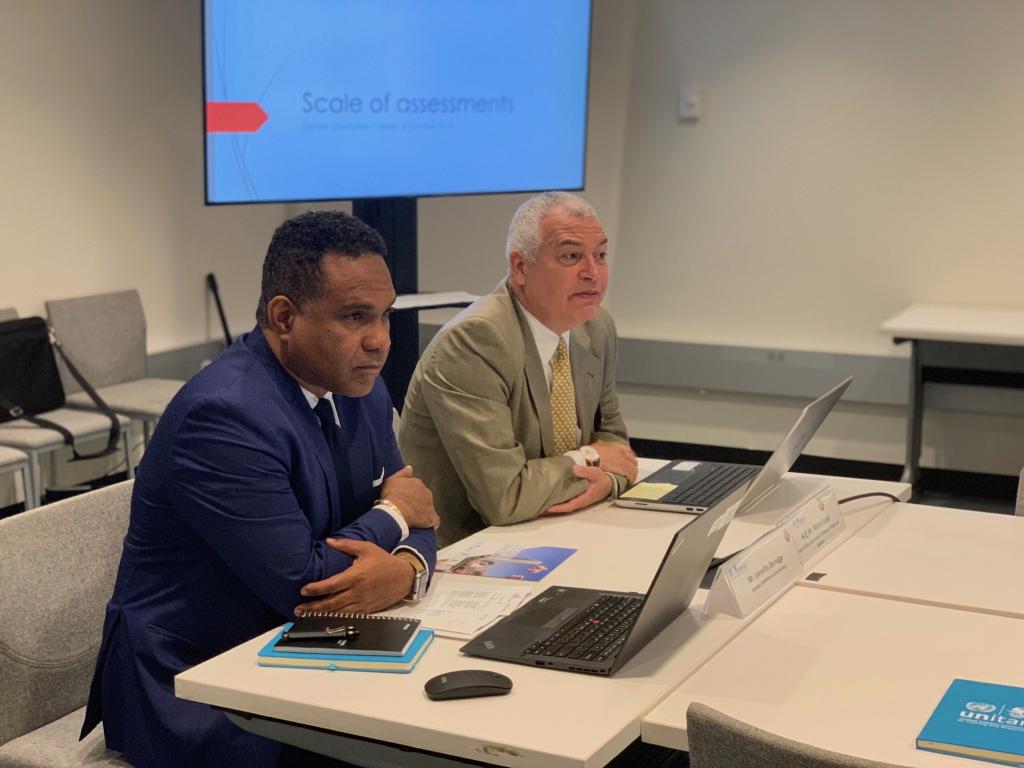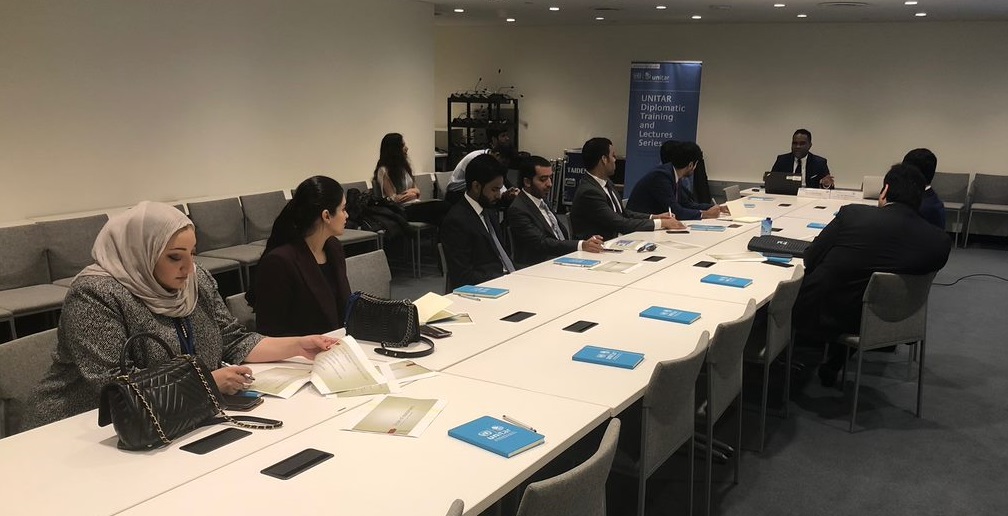UNITAR Hosts Scale of Assessment Course for Diplomats of the Permanent Mission of the State of Qatar
 2 October 2018, New York, NY, USA – The United Nations for Training and Research (UNITAR) hosted a training for Diplomats of the Permanent Mission of the State of Qatar on Scale of Assessment, held in the United Nations at the United Nations Building. This was the final part in the Induction Course for the Qatari diplomats in “Strengthening Knowledge and Skills in Multilateral Diplomacy”.
2 October 2018, New York, NY, USA – The United Nations for Training and Research (UNITAR) hosted a training for Diplomats of the Permanent Mission of the State of Qatar on Scale of Assessment, held in the United Nations at the United Nations Building. This was the final part in the Induction Course for the Qatari diplomats in “Strengthening Knowledge and Skills in Multilateral Diplomacy”.
UNITAR New York Head of Office Mr. Marco Suazo opened the session by welcoming the diplomats from the Qatari Mission to the training session. In his welcoming remarks, Mr. Suazo reminded the delegates of the importance the United Nations and his hope to see close collaboration between the delegates and the United Nations in the future as a result of these trainings. After making his welcoming remarks, Mr. Suazo handed over to Secretary of the Committee of Contributions, Mr. Lionelito Berridge. Mr. Berridge spoke on the topic of Scale of Assessments within the United Nations, which is the term used for the amount of money that the General Assembly determines should be assessed to finance the approved appropriation, which is shared among Member States to pay for the expenses of the Organization.
 Mr. Berridge began by speaking on the Reports on rates of assessment for 2019-2021, reviewing the methodology for the scale of assessments for financing the regular budget and indicative rates of assessment for 2019-2021. He also looked at the UN Secretary-General's Report on PKO levels, which provides the composition of peacekeeping levels based on GA established criteria. Mr. Berridge additionally spoke about the role of the Committee on Contributions, how it advises the General Assembly on the apportionment of the expenses of the Organization among member states broadly according to capacity to pay. Mr. Berridge looked at regular budget Income measure, which looked at GNI Income in national currency, with conversion rates provided by the International Monetary Fund, and the compromise of Base Period Calculations between 3 years and 6 years. He also looked at Debt Burden Adjustment and Low per Capita Income Adjustment, with special attention on limits to the scale.
Mr. Berridge began by speaking on the Reports on rates of assessment for 2019-2021, reviewing the methodology for the scale of assessments for financing the regular budget and indicative rates of assessment for 2019-2021. He also looked at the UN Secretary-General's Report on PKO levels, which provides the composition of peacekeeping levels based on GA established criteria. Mr. Berridge additionally spoke about the role of the Committee on Contributions, how it advises the General Assembly on the apportionment of the expenses of the Organization among member states broadly according to capacity to pay. Mr. Berridge looked at regular budget Income measure, which looked at GNI Income in national currency, with conversion rates provided by the International Monetary Fund, and the compromise of Base Period Calculations between 3 years and 6 years. He also looked at Debt Burden Adjustment and Low per Capita Income Adjustment, with special attention on limits to the scale.
 After Mr. Berridge had finished his presentation, Mr. Suazo then announced UNITAR's upcoming Lecture Series on Conflict Resolution, Mediation and Negotiation, organized in coordination with Columbia Law School and The Permanent Mission of Sweden to the United Nations. The Lecture Series, which takes place in October and November 2018 at the United Nations, goes over “Conflict Resolution and Enduring Access to Justice in Developed Nations”, “Women, Peace and Security: Achieving Gender Equity in Conflict Resolution”, and “Leadership and Conflict Resolution: Leading Self and Leading Others”. Mr. Suazo then ended the session by thanking diplomats of Permanent Mission of the State of Qatar for attending UNITAR’s series of trainings over the past month, and granted them Certificates of Completion in a brief closing ceremony. This concluded the Induction Course for the Qatari diplomats in “Strengthening Knowledge and Skills in Multilateral Diplomacy”.
After Mr. Berridge had finished his presentation, Mr. Suazo then announced UNITAR's upcoming Lecture Series on Conflict Resolution, Mediation and Negotiation, organized in coordination with Columbia Law School and The Permanent Mission of Sweden to the United Nations. The Lecture Series, which takes place in October and November 2018 at the United Nations, goes over “Conflict Resolution and Enduring Access to Justice in Developed Nations”, “Women, Peace and Security: Achieving Gender Equity in Conflict Resolution”, and “Leadership and Conflict Resolution: Leading Self and Leading Others”. Mr. Suazo then ended the session by thanking diplomats of Permanent Mission of the State of Qatar for attending UNITAR’s series of trainings over the past month, and granted them Certificates of Completion in a brief closing ceremony. This concluded the Induction Course for the Qatari diplomats in “Strengthening Knowledge and Skills in Multilateral Diplomacy”.
Photo 1: Head of UNITAR New York Office Mr. Marco Suazo opening the session on Scale of Assessments by Mr. Lionelito Berridge. Photo: UNITAR.
Photo 2: Mr. Lionelito Berridge talking to the diplomats of the Permament Mission of the State of Qatar about Scale of Assessments in the United Nations. Photo: UNITAR.
Photo 3: Head of UNITAR New York Office Mr. Marco Suazo presenting the diplomats from the Qatar Mission with their certificates for completing the induction course. Photo: UNITAR.

